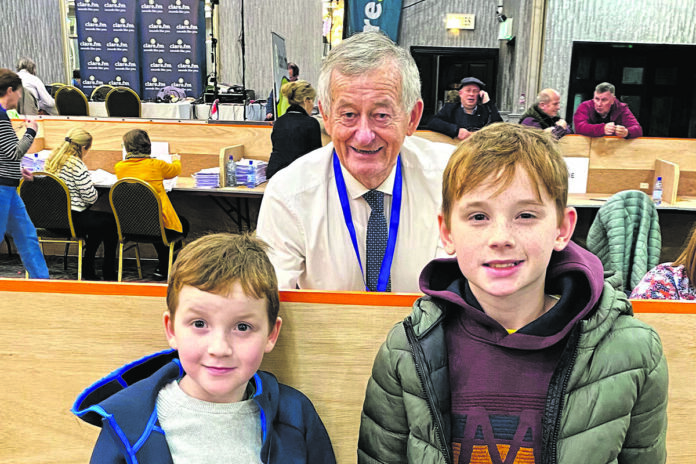BACK in 1974 Cranny’s Pat Shannon was involved in the counting of the votes in that summer’s local elections.
A half century later, he spent last weekend in the West County, still part of the team making sure that the public’s preferences are calculated accurately.
“Since 74 I think I’ve done every one of the general elections, local elections and referendums done up until yesterday,” he said on Monday, as he recovered from a really draining weekend.
Pat acted as a supervisor in the West County on Saturday and Sunday, reflecting his long years of involvement.
“I would have started off as a member of the counting staff. Over the years I got a bit more experience and I moved up to the role of supervisor. I would have been Acting Deputy Returning Officer for the local elections for a good few years,” he says.
He was pleased with how things had gone, even though there were challenges with 20 names on the ballot paper.
“It went well. The ballot paper was very, very long so it was a little bit more complicated to count and sort the votes because of that,” he said.
“It just takes that bit longer. But we had no mistakes all the way through. We put an awful lot of emphasis on doing it correctly, doing it slowly and doing it right.”
Progress was quite slow due to the number of people who had to be eliminated, but it would have been a lot slower if the quota had been breached on the first count.
“I think it was the sixteenth count yesterday before we finished. You have to eliminate everyone, in one case we were able to eliminate two people together, but generally it’s one by one. We were very happy though, if we had a surplus in the first count it would have delayed it more. Not having it speeded up the process,” he said.
If a candidate is elected after the first count it is only the transfers that got them over the line that have to be redistributed. But if they are elected solely on their own first preferences, all of their number twos have to be totted up and the surplus divided accordingly.
“If they are elected after receiving transfers it’s only the papers that elect the candidate that we go back over,” he said.
“Say for example when Timmy was elected it was only the last bundle that we had to go back and distribute. But if Timmy had got over the quota on the first count, say if he got 14,000 first preferences, we’d have to go back and analyse all of the 14,000.
“We’d go through all of the second preferences and do a calculation of what proportion of the surplus would go to each candidate.”
No doubt proportional representation is a complicated electoral system, but he says it is also clear to those involved in the count what the appropriate steps are at all times, and it generally goes smoothly.
Pat, like many others, enjoys the excitement that goes with a count, as dreams of some come true and those of others are shattered.
“There is great excitement and a great buzz around the count centre with everybody there. There’s lots of excitement and lots of disappointment,” he said.
“Generally the candidates never appear early, they wait to hear what the tallies are before appearing, it’s only at that stage that they start coming in.
“Some people come in even though they are losing, they take it on the knuckles. With the excitement of the people who get elected, there would be a nice buzz around the centre.”
He has memories of all the major moments in Clare’s recent electoral history, and remembers a night years ago when a close watch had to be kept to make sure the vote was not subverted.
“Fianna Fail would have had 3:1 for a good number of years. Then in the West County it looked like it would turn out to be 2:2, which it subsequently did turn out to be,” he said.
“When the count was being closed after night one, there were a lot of people watching everything to make sure nobody went in and interfered with the papers that night.
“We had to have very strong security and to make sure the Gardaí were present and the room was sealed where the votes were.
“There was a fear that the ballot papers would be set on fire or something like that, and there’d have to be another election. There was a lot of emphasis on securing the building and making sure the papers were safe until the final result.”
He was actually involved in the electoral process before the count also, and then had two very long days on Saturday and Sunday at the count centre.
“I was an area supervisor checking the presiding officers on Friday, that was a full 15 hours. Saturday was 9am to midnight and Sunday was 9am to 8pm,” he said.
“There was very little done today [Monday], very little movement, the body is a bit wrecked, but we’ll get over it.”
His role in the count is very busy, and it is important to keep a clear head.
“There’s a lot of walking, a lot of movement of the hands and the legs,” he said.
“You have to keep calm and keep cool all the time as well. You can’t rush things for fear of making a mistake.
There’s a good team of us there with the returning officer and there’s a few supervisors. We sit around after every count and make sure we’re getting it right before we make the next decision on a surplus to be distributed or a candidate to be eliminated.”
In the local elections in particular the margins are really fine, and mistakes in the counting process could easily distort the outcome.
“With local elections you’d be talking about hundreds of votes rather than thousands,” he said.
“Then there could be three or four votes between candidates and you really have to scrutinise each paper.”
The public are frequently urged to vote as far down the ballot paper as they can, and he says the importance of doing this was illustrated in the final count on Sunday evening, with distant preferences going to the three remaining candidates, Donna McGettigan, Joe Cooney and Leonora Carey.
“A lot of people voted 1-20 and we saw cases where people who gave a number 14 or 15 to a candidate which ended up counting as a full vote. It came back to someone,” he said.
Having been involved in election counts for so long, he says that he has met generations of some families on the days of counts.
“Some of the councillors who were there remembered me from being in counts when they were only young lads coming in with their fathers,” he said.
“It’s nice to see that type of recognition.”
Pat worked in Clare County Council for many years and he is glad to still be involved in public service through the counts.
“I’m retired eight years from the public sector and I’m still called back to help out in the elections and it’s a privilege to be asked,” he said.
“I don’t say no.”
Owen Ryan has been a journalist with the Clare Champion since 2007, having previously worked with a number of other publications in Limerick, Cork and Galway. His first book will be published in December 2024.


